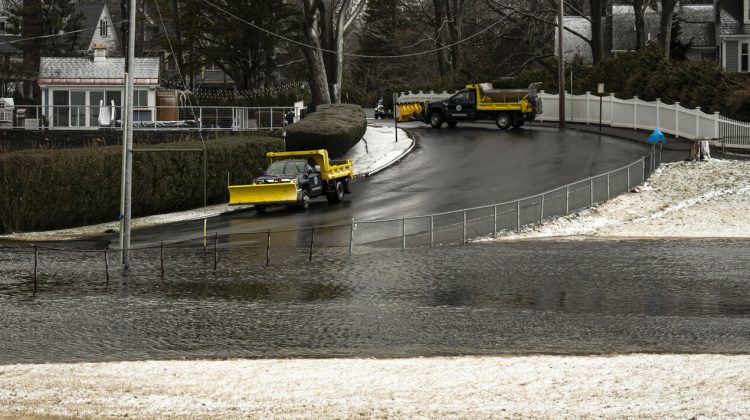Swampscott Director of Public Works Gino Cresta called in and paid a handful of contractors on Monday night. Many towns and cities in the region were supposed to be pummeled by about a foot of snow the next day, and Cresta had to book the contractors quickly before other municipalities got to them first.
But when Tuesday morning came, there was almost no snow to clean up.
“The only resources that I didn’t use that I had called in were a handful of contractors that I had to pay a four-hour minimum to, and the estimate is $2,500,” Cresta said.
The cost of the unused contractors is Swampscott is one example of the economic impacts caused by the preparations taken for a snowstorm that never came.
George Markos, the owner of Brothers Deli in Lynn, said that the restaurant only made around half of its usual sales that day. He said it is likely that many people stayed home expecting a snowstorm.
Markos said he also sensed panic among his employees about whether or not they would lose a day of work, which didn’t happen because he decided to keep the restaurant open.
“People told me, ‘George, I don’t think it’s going to snow,’ and I felt the same way — not because I know how to tell the weather, but from living life,” Markos said.
Lissette Mateo, the owner of BLT’s Breakfast Lunch & Takeout in Lynn, also said that sales at her restaurant were down that day.
She assumed that fewer people came to BLT’s on Tuesday because of the city’s parking ban, which prevented customers from parking on the street to eat at restaurants in Downtown Lynn.
Both Markos and Mateo said that false weather alarms like this happen a few times each year.
Moonsu Han, an economics professor at North Shore Community College, described how the false alarm might have financially affected Lynn, which has a population of roughly 100,000 people.
“During snow days, kids don’t go to school, and if both couples are working, they need to hire babysitters or sacrifice a day of work,” Han said. “Let’s say that there’s around 25,000 parents, assuming a household has four people, and let’s say 10,000 of those have to work. If babysitting is $100 a day, that’s $100,000 in costs.”
However, Han said there are things to consider other than the financial losses from the false alarm.
“But how can we quantify the happiness and positive impact that one gets from unexpected leisure?” Han said. “If you’re happier and have had more rest, your productivity might be higher tomorrow.”
In Marblehead, Town Administrator Thatcher Kezer said the town’s municipal buildings were closed on Tuesday. However, he and many of the town’s non-union employees came into work anyway, and he said they were able to concentrate on projects that often get interrupted on typical workdays.
“This turned into a very quiet day to be in the office to focus on the things you struggle to get to,” Kezer said.
Leigh Gerow, a former Saugus School Committee member and the parent of a Belmonte STEAM Academy student, didn’t view Tuesday’s school cancellations as a complete loss.
“I think that we need to keep in mind the needs of the people and teachers who work with our kids, because they’re also gonna have to take care of their families,” Gerow said. “I also think that it’s not been a terrible winter and we haven’t had lots of snow days, so whether there was snow or not, it’s not really gonna affect the trajectory of our children going forward.”

